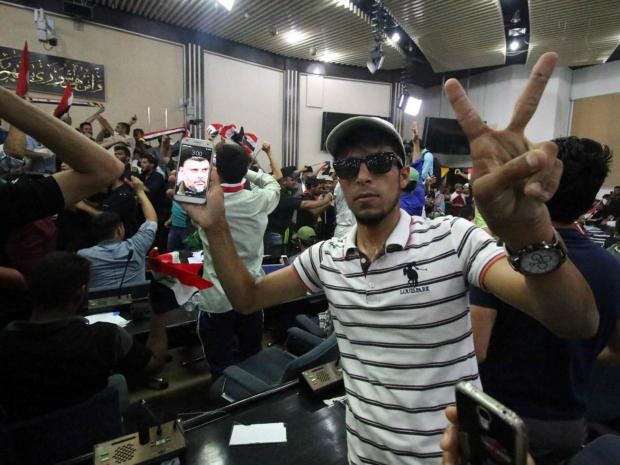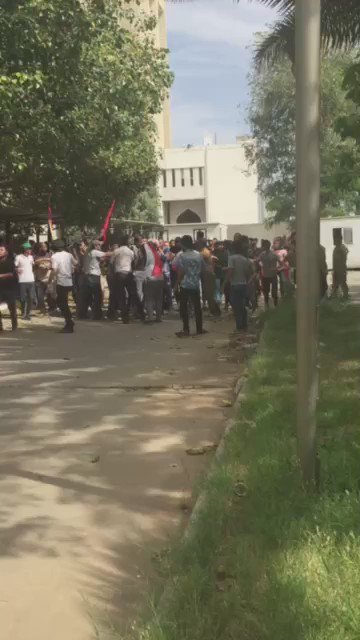Obama's Plan Askew in Iraq
"There's a realization that the government, as it's currently structured, can't hold. It's just not clear how the Iraqis get out of this. I just don't see how they will."
Doug Ollivant, former military planner in Baghdad, senior fellow, New American Foundation
"We get seized with individual personalities. We fall in love with them. I agree that Abadi is, generally speaking, a good ally of the United States, but there isn't much under his control."
Ali Khedery, special assistant to U.S. ambassadors in Baghdad, 2003 to 2009
"Iraq is becoming increasingly ungovernable. Non-state actors are stronger than the state. The government is paralyzed and corrupt."
Emma Sky, former senior political adviser to U.S. military

Protesters pressure the Iraqi government to implement reforms. AP photo.
What supreme irony. Islam, which prides itself on its aversion to corruption and in which Sharia law forbids the taking of interest as perversely corrupt, somehow fails to address the issue of ingrained corruption on a mass, integral scale in most Muslim countries. When Muslim masses rebel they cite the state-sanctioned and social-cultural situation of corruption that invades every facet of life and government and societal custom.
Added to the institutionalized corruption is the sectarian hatred among Muslims with each segment of the two major sects, Sunni and Shiite claiming the other to be apostate, effectively non-Muslim. The deadly rancour evidenced in slanderous threats and morbid mass violence that takes innumerable lives reflects none other than the religion of peace that declares itself to be the last and final word of god on earth.
When the U.S.-led coalition that removed Saddam Hussein from office elevated an expression of solidarity among the sects and the tribes to equality in an administration that reflected the three major components of the Iraqi population, among the Kurds, the Sunnis and the Shiites, the impetus behind it was to ensure that no group would be left behind, that equality would prevail and the raging violence that set each upon the other would be stilled.
The three groups shared the administration of the nation, in an Iraqi transitional government with a Shiite, a Sunni and a Kurd sharing the highest government offices in a gesture of equality. Which lasted until the United States withdrew its prominence from the country, taking its military back home, at which time the majority Shiite parliament accused the Sunni vice-president of war crimes.
Controversies between Shiite, Sunni and Kurd were so great consideration was given to splitting the country in three. The only portion of the country that was well governed and where peace prevailed was in fact, the Kurdish autonomous district. Which now represents the only reliable fighting force against the presence of the Islamic State caliphate which has succeeded in capturing a third of the country, only lately realizing some geographic losses.
The U.S. continued to believe that unity could prevail despite the years post-invasion that saw bloody massacres take place between the Shiite and the Sunni populations. The Obama administration is focused on removing the threat of Islamic State of Iraq and the Levant firstly, and anticipated succeeding in having Iraq finally find a balance between its sects to form a coalition to successfully battle ISIL and retake Mosul, with the aid of American air power.
The Shiite cleric Moqtada al-Sadr whose bitter opposition to American presence in Iraq is legendary, has incited his followers to mount a violent protest in Baghdad against the government to protest massive corruption amid a faltering economy thanks to the fall in oil prices. A demonstration of thousands of Sadr followers succeeded in invading the protected Green Zone and finally to surge into parliament in a destructive frenzy where the Iraqi parliamentary speaker had his desk stomped on by demonstrators.
 |
| Supporters of cleric Moqtada al-Sadr, pictured on phone, claim they have rooted out corruption AFP |
Iran, with its influence on both Moqtada al-Sadr and the Iraqi government, persuaded Sadr to call off the demonstration spurred by a lack of potable water and electricity. To emphasize their contempt for their corrupt parliament, demonstrators smashed chairs and windows in the parliament building while cursing lawmakers and chanting slogans. Unity in Iraq? The possibility of retaking Mosul? Making the country whole again?


<< Home